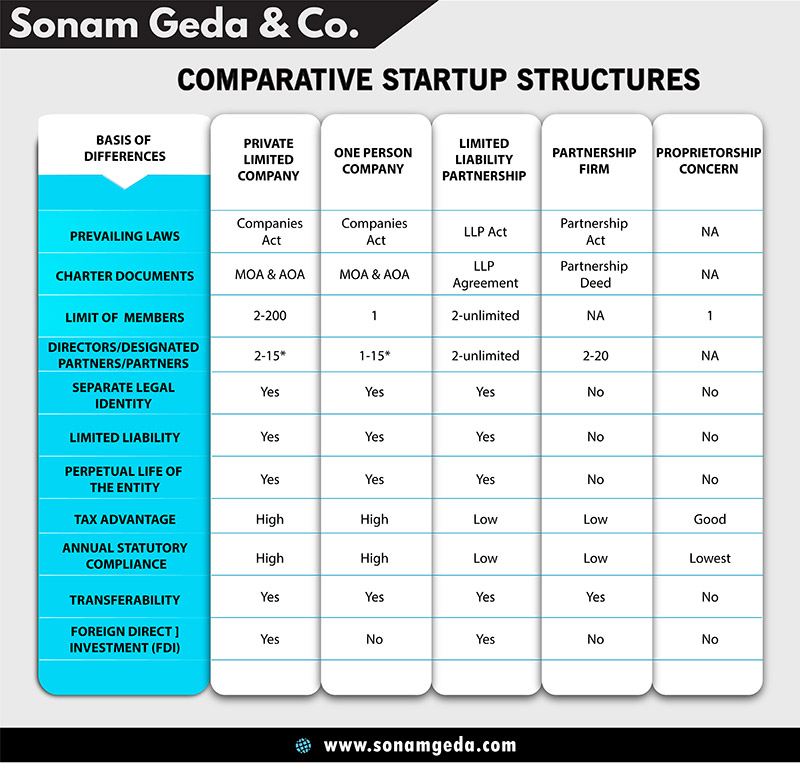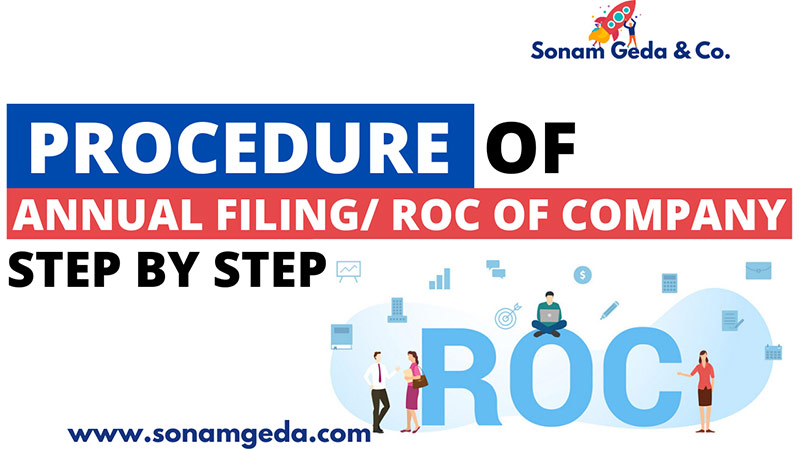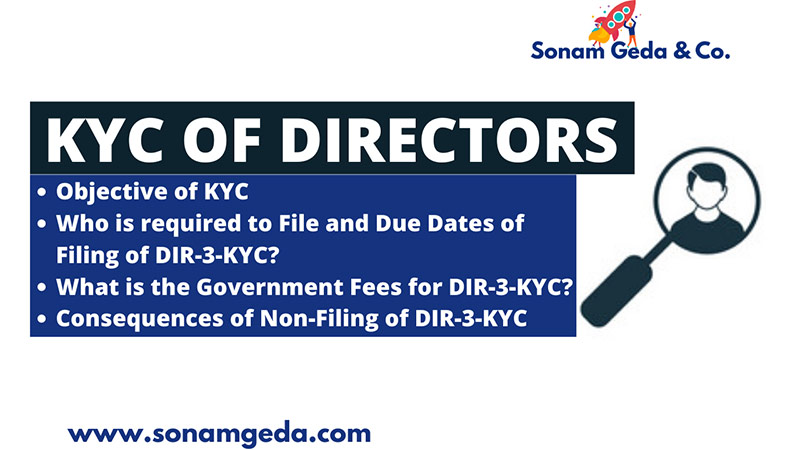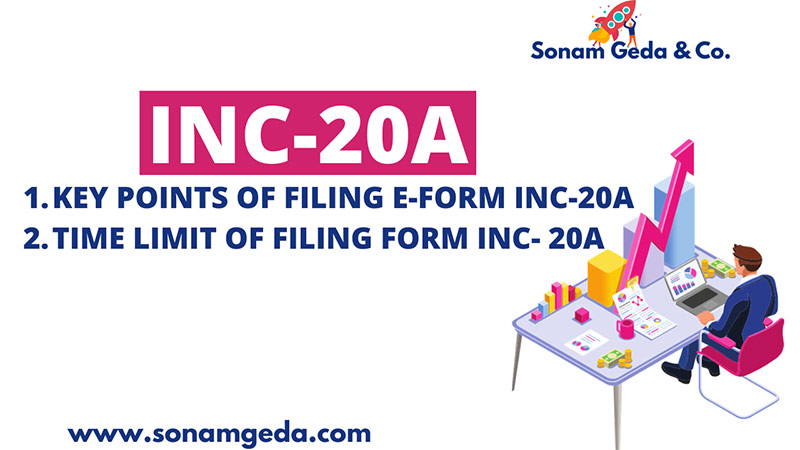Private Limited Company

What is Private Limited Company?
Section 2 (68) of Companies Act, 2013 states that a private company means a company having a minimum paid-up share capital as may be prescribed, and which by its articles:
- Restricts the right to transfer its shares.
- Limits the number of its members to two hundred except in case of OPC.
- Prohibits any invitation to the public to subscribe for any securities of the Company.

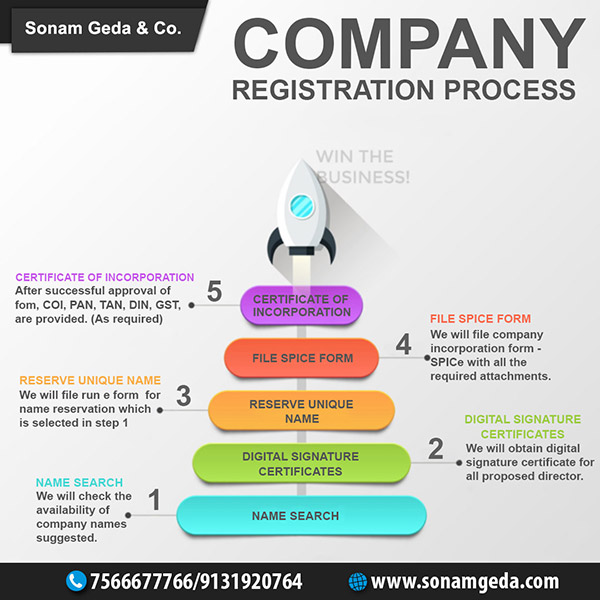

Incorporation Procedure of Private Company
| Overview of Web forms | A new Web-based Form named ‘SPICe+‘ (pronounced as 'SPICe Plus') is an integrated Web-based form offering multiple services like 'name reservation', incorporation, 'DIN allotment', mandatory issue of PAN, TAN, EPFO, ESIC, Profession Tax (Maharashtra), and 'Opening of Bank Account' & GST (Optional). |
|---|---|
| Name Reservation | Company has two option available either first reserve the name in Spice+ Part-A and then apply in Spice+ Part-B or directly apply name with incorporation form than challan will not be required.In case company reserves the name first than challan needs to be paid of Rs. 1000 SRN will be mandatory required. |
| Filling Part B of Spice+ | • All first subscribers of SPICe+ MOA (INC-33) must have DSC, if they are less than 7 then it will be signed in the form itself no annexure will be required & in case if more than 7 then separate attachment of MOA will be annexed without DSC. • Articles of Association is entrenched with brief description about the clause (Make sure the article number matches with form SPICe+ AOA (INC-34) )-Select the particular table which is applicable and make the appropriate changes and incorporate first directors name and in case subscribers are more than 7 then AOA will attached separately (as there are only 7 member so DSC slot available in the form) • Declaration by the subscribers and the first directors in INC – 9 shall be auto-generated in PDF format and submitted electronically. • The object clause should be relevant and company must be engaged in that business only. • There is no separate application to be filed for allotment for DIN .it will be allotted with the details filled in the form in the tab directors not having DIN. • After filling all the details stamp duty fees need to be paid which can be done through MCA or without MCA portal. • Application for PAN number and TAN number also will be processed with spice e Plus form by selecting respective area code, AO type, Range code & AO No. After completion of these form, it should be acknowledge by DSC of CS/CA/CWA. • Spice + AGILE PRO form is mandatory for all companies which includes following registration that is GST Registration which is optional, ESIC(Employee State Insurance Corporation) Employees' Provident Fund organization (EPFO) Registration (Mandatory) and Profession Tax Registration in case if company is of Maharashtra and Opening of Bank Account is compulsory. • After filling up Part B, we have to carry out a ‘pre-scrutiny’ check. Once the ‘pre-scrutiny; is successful, click on ‘submit’. A confirmation is displayed upon successful submission of the form. • After submission of these form, it should be acknowledge by DSC of CS/CA/CWA.A Service Request Number is generated for making a payment towards company incorporation. Once the payment is made successfully, the forms would be processed. • In case form is need to be resubmitted due to any error or omission, then form will be resubmitted in the same manner. |
| Certificate of Incorporation of Private Company | After completion of process and successful approval of form, certificate of incorporation, Tan allotment letter, PAN card of Company and DIN of directors will be issued. Along with GST Registration certificate, ESIC and EPFO certificate, Professional tax registration (For Maharashtra), Opening Bank account. |
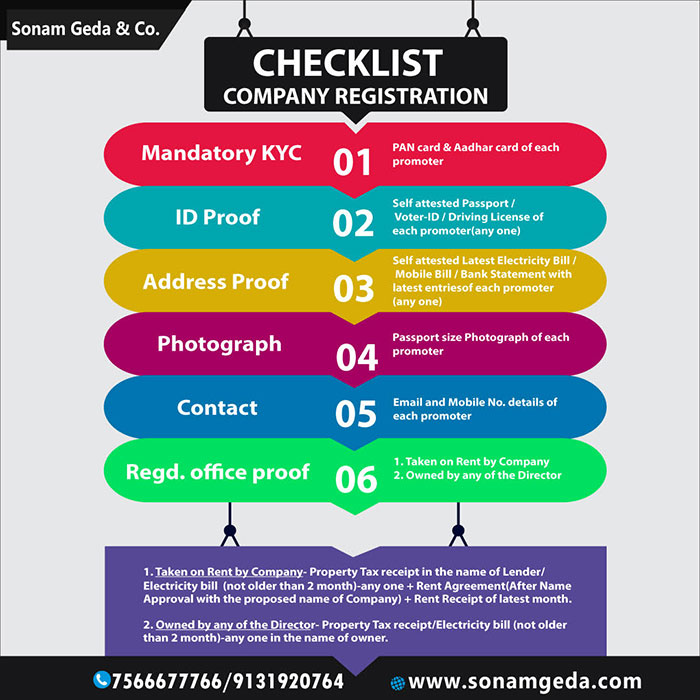
Documents Required for Private Limited Company
- PAN card and address Aadharcard of directors and shareholders are mandatory.
- ID Proof: Self attested Passport / Voter-ID / Driving License (any one)
- Address Proof: Self attested Latest Electricity Bill / Telephone Bill / Mobile Bill / Bank Statement with latest entries(any one)
- Passport size Photograph for each Director/ Shareholder.
- Email and contact details of each director/member
- Registered office Address proof :
1. Taken on Rent by Company- Property Tax receipt in the name of Lender/Electricity bill (not older than 2 month)-any one + Rent Agreement(After Name Approval with the proposed name of Company) + Rent Receipt of latest month.
2. Owned by any of the Director- Property Tax receipt/Electricity bill (not older than 2 month)-any one in the name of owner.


E-Forms to be Filed for Private Limited Company
- Spice+ (INC 32)
- Spice+ AOA (INC -34)
- Spice+ MOA (INC-33)
- Spice+ AGILE PRO (INC-35)
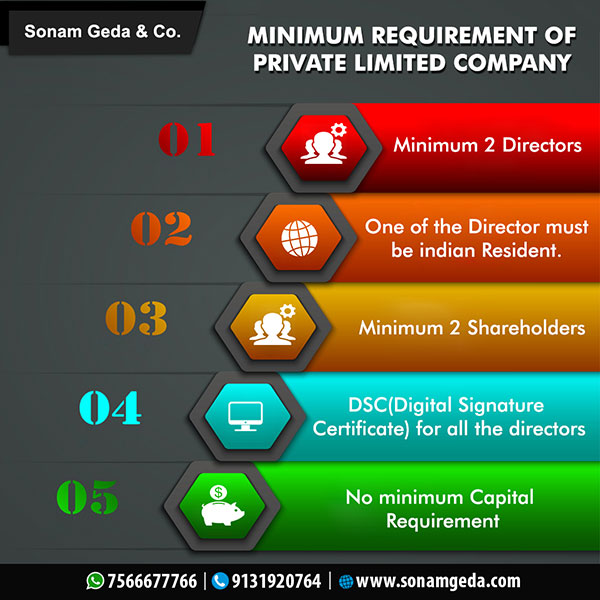
Minimum Requirement for Private Limited Company
- One of the Director must be Indian Resident.
- Minimum 2 Shareholders
- Minimum 2 Directors (The directors and shareholders can be same person with minimum share capital of Rs. 2)
- DSC (Digital Signature Certificate) for all the Directors


Attachment Required for Private Limited Company
- Memorandum of Association (if more than 7 subscribers)
- Articles of Association(if more than 7 subscribers)
- Subscriber Sheet(if more than 7 subscribers)
- Consent to act as Directors
- INC-9 Declaration by Directors
- Proof of office address:Details As mentioned above
- Interest of first director(s) in other entities (if any)
- Proof of identity and residential address of the Directors & members.
Private Company Government Fees
Spice form Fees
• In case of company having share capital
| Nominal Share Capital | Fee applicable |
| Up to 15,00,000 | N/A |
| More than 15,00,000 | Rupees 500 |
• In case of company not having share capital
| Number of members | Fee applicable |
| Up to 20 members | N/A |
| More than 20 members | Rupees 500 |
Stamp duty for MOA and AOA is Rs. 7550 (Madhya Pradesh)
Pan and Tan Fees is Rs. 131
Name Reservation Fees: In case applied separately in Part A for Name Reservation than Rs 1000



Benefits of Private Company
- Separate legal identity: A Private limited Company is separate from its owners, it has its own existence and legal identity that from its owners.
- Long term Existence: Private limited Companies are not affected by the existence of their owners . It continues even after the inability or death of the owners and does not hinder the workings of the company.
- Limited liability: Unlike Proprietorship and Partnership firms, the liability of the members of the company is limited to the extent of their share holding amount due to company.
- Capacity to Sue and be Sued: The Company in its own name can proceed legal Proceeding and even legal proceeding can be initiated against company being its independent identity.
- Easy Money Raising: The private limited can raised the fundthrough bank loans, Angel Investors, Venture Capitalists, in comparison to LLPs and OPCs.
- No Minimum Capital Required: The MCA in its amendments has removed the minimum capital requirement clause for incorporation of private limited company which acts as an advantage for its existence.
- Goodwill & recognition in the Market: Private limited is most recognized form of business structure and all the stakeholders would like to deal with these private companies instead of other form of business.
- Protection to the personal assets of Directors: In case of private limited company, Personal assets and savings of Directors are safe when company is not able to pay it’s dues.
Income Tax Under Private Limited Company
Following rates are applicable in case of a private limited company
| Type of company | Rate of tax applicable | Surcharge | SHEC |
|---|---|---|---|
| Domestic company | 25% (less than 400 crores Turnover of PY2017-18) | 1Cr. to 10cr. -7% More than 10 cr.-12% |
4% |
| Domestic company opting deduction under special scheme | 15%(small scale industries with certain conditions) 22%(Companies who are currently using the 25% scheme can one time switch to this scheme ) |
Applicable surcharge rate Mandatory surcharge of 10% |
4% |
| Domestic company who does not categories in any special scheme | 30% | 1Cr.-10cr. -7% More than 10 cr.-12% |
4% |

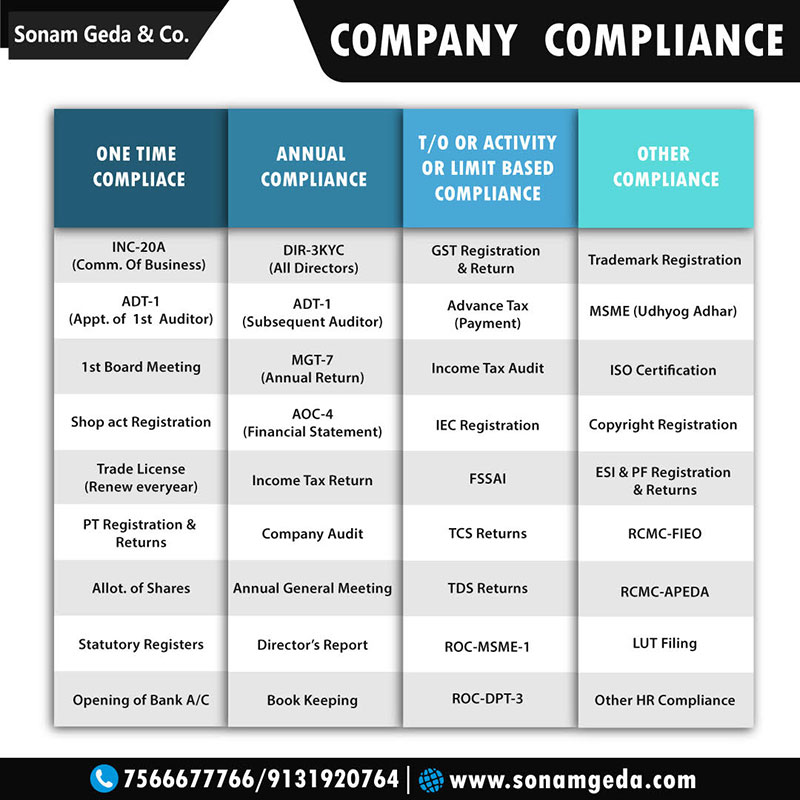

What is private limited Company?
Section 2 (68) of Companies Act ,2013 states that a private company means a company having a minimum paid up share capital as may be prescribed, and which by its articles:
- Restricts the right to transfer its shares.
- Limits the number of its members to two hundred except in case of OPC.
- Prohibits any invitation to the public to subscribe for any securities of the Company.
What are the steps for registration of private limited company?
- STEP 1: Name search: We will check the availability of the company names suggested.
- STEP 2: Digital Signature Certificate: We will obtain digital signature certificate for all proposed directors.
- STEP 3: Reserve Unique Name: We will file RUN E-Form for name reservation.
- STEP 4: File SPICe Form: We will file company incorporation form SPICe with all required attachments.
- STEP 5: Certificate of Incorporation: After successful approval of form COI, PAN, DIN, TAN, GST are provided.
What is DIN (Director Identification Number)?
DIN means an Identification Number which the Central Government may allot to any individual, intending to be appointed as director or to any existing director of a company, for the purpose of his identification as such. It is an 8 digit unique identification number which has lifetime validity. DIN is required for all existing and new (proposed) directors of a company.
What is DSC (Digital Signature Certificate)?
A Digital Signature is the electronic signature duly issued by certifying authority that shows the authority of the person signing the same. It is an electronic equivalent of a written signature. Every user who required to sign an e-form for submission with MCA is required to obtain a Digital Signature Certificate.
What are the documents required for registration of Private limited company?
- PAN card and address Aadharcard of directors and shareholders are mandatory.
- ID Proof: Self attested Passport / Voter-ID / Driving License (any one)
- Address Proof: Self attested Latest Electricity Bill / Telephone Bill / Mobile Bill / Bank Statement with latest entries(any one)
- Passport size Photograph for each Director/ Shareholder.
- Email and contact details of each director/member
- Registered office Address proof :
1. Taken on Rent by Company- Property Tax receipt in the name of Lender/Electricity bill (not older than 2 month)-any one + Rent Agreement(After Name Approval with the proposed name of Company) + Rent Receipt of latest month.
2. Owned by any of the Director- Property Tax receipt/Electricity bill (not older than 2 month)-any one in the name of owner.
What is the minimum requirement for Private limited company?
- One of the Director must be Indian Resident.
- Minimum 2 Shareholders
- Minimum 2 Directors (The directors and shareholders can be same person with minimum share capital of Rs. 2)
- DSC (Digital Signature Certificate) for all the Directors
What is the minimum capital requirement for Private limited company?
There is no minimum capital requirement for registration of Private Limited Company as such. The MCA in its amendments has removed the minimum capital requirement clause for incorporation of private limited company.
What is the concept of separate legal entity?
A company being a legal person is entirely distinct from its members and is capable of enter into contracts, possess properties in its own name, sue and can be sued by others etc.
What is MOA (Memorandum of Association) and AOA (Articles of Association)?
The MOA is a document which sets out the constitution of a company and is therefore the foundation on which the structure of the company is built. It defines the scope of the company’s activities and its relations with the outside world.
The articles of association of a company are its bye-laws or rules and regulations that govern the management of its internal affairs and the conduct of its business. It deals with the rights of the members of the company inter se. They are subordinate to and are controlled by the MOA.
What are the advantages of Private Limited Company?
- Separate legal identity: A Private limited Company is separate from its owners, it has its own existence and legal identity that from its owners.
- Long term Existence: Private limited Companies are not affected by the existence of their owners . It continues even after the inability or death of the owners and does not hinder the workings of the company.
- Limited liability: Unlike Proprietorship and Partnership firms, the liability of the members of the company is limited to the extent of their share holding amount due to company.
- Capacity to Sue and be Sued: The Company in its own name can proceed legal Proceeding and even legal proceeding can be initiated against company being its independent identity.
- Easy Money Raising: The private limited can raised the fundthrough bank loans, Angel Investors, Venture Capitalists, in comparison to LLPs and OPCs.
- No Minimum Capital Required: The MCA in its amendments has removed the minimum capital requirement clause for incorporation of private limited company which acts as an advantage for its existence.
- Goodwill & recognition in the Market: Private limited is most recognized form of business structure and all the stakeholders would like to deal with these private companies instead of other form of business.
- Protection to the personal assets of Directors: In case of private limited company, Personal assets and savings of Directors are safe when company is not able to pay it’s dues.
What is Authorised Share Capital and Paid up Share Capital?
The authorized share capital of a company is the amount of share capital that the company is authorized by its constitutional documents to issue (allot) to shareholders.
Paid-up Share Capital of the company is the part of authorized share capital for which the shares were issued to the shareholder. Paid-up capital is the amount that is actually paid by the shareholders to the company.
What is the limited liability protection?
The company, being a separate person, is the owner of its assets and bound by its liabilities. The liability of a member as shareholder extends to the contribution to the share capital of the company up to the nominal value of the shares held and not paid by them. In other words, a shareholder is liable to pay the balance, if any, due on the shares held by him, when called upon to pay and nothing more, even if the liabilities of the company far exceed its assets.
Who is ROC (Registrar of Companies)?
The Registrar of Companies is the government authority under the Ministry of Corporate Affairs which deals with registration, administration and regulation of Limited Liability Partnership (LLP) and Companies registered under Companies Act,2013 and Companies Act,1956.
What is difference between Private Company and different form of organisation?
We have prepared a detailed and easy to understand comparative table showing availability of features and advantages of one form of business to that of others. The same can be found at the end of this page.

Subscribe Our Newsletter
Get useful latest news & other important update on your email.





